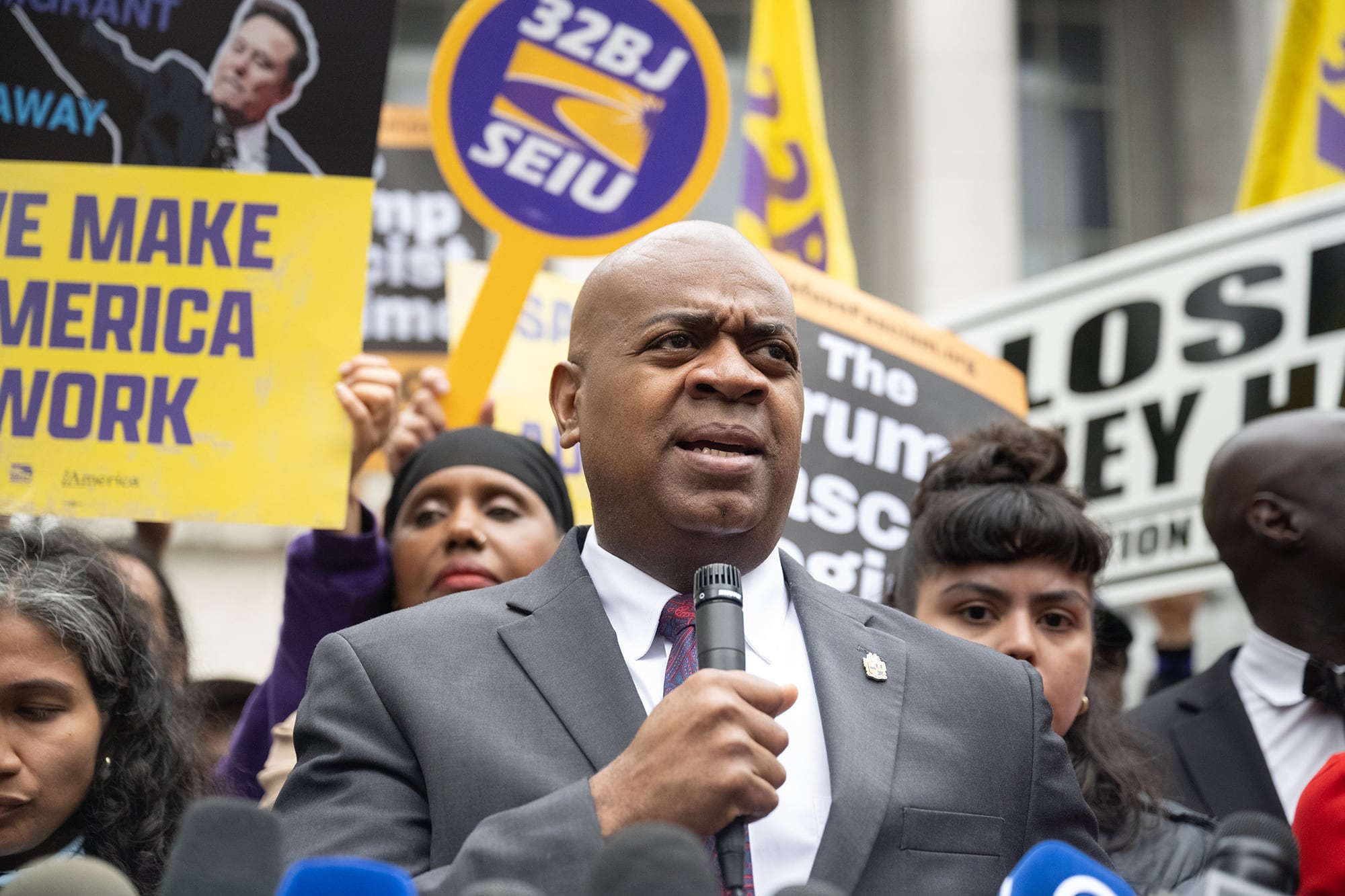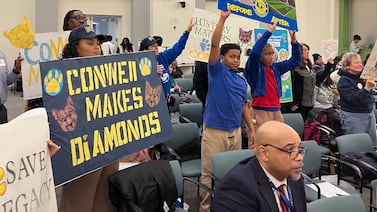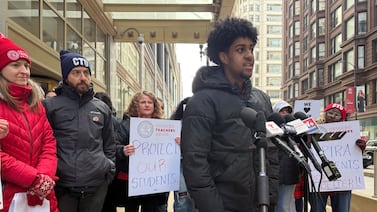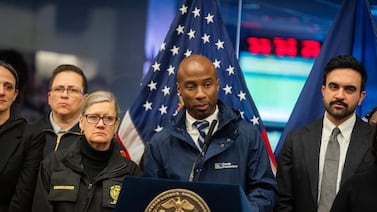Sign up for Chalkbeat Newark’s free newsletter to get the latest news about the city’s public school system delivered to your inbox.
Newark Mayor Ras J. Baraka’s gubernatorial campaign has garnered headlines for his fervent defense of undocumented immigrants. He was arrested for allegedly trespassing at a detention facility on charges that were later dropped and then subsequently filed a lawsuit against a Trump-appointed federal prosecutor over the fiasco.
As a former Newark Public Schools student, teacher, and principal, Baraka’s rhetoric around schools on the campaign trail has also been notable and fiery.
A public education advocate, he has declared the state school funding system “broken,” criticized local charter schools, and championed school desegregation initiatives as he seeks to win the Democratic party’s ticket in the Tuesday primary. With a self-described “heavy hand” in the way Newark schools have been run since the state takeover of the district ceased, his education track record in the city could provide insight on how he would influence education on a statewide scale.
Baraka is one of six candidates vying to be the Democratic nominee. On the Republican side, five candidates are running to become their party’s nominee in the race for New Jersey’s next governor. Gov. Phil Murphy, in his second term, can’t run for another, per the state constitution.
When the Newark school district was in the process of regaining local control, residents voted to have an elected board instead of one appointed by the mayor, a choice Baraka staunchly favored. Today, the board is run by the candidates he’s backed year after year with his powerful endorsement — a show of his continued sway over city schools.
The mayor has been behind several significant educational endeavors in the city, from a literacy action plan to reengagement centers and community schools. Still, a majority of Newark students are struggling to perform on grade level in reading and math, and the district was placed on a state-approved improvement plan due to low state test scores.
Those persistent issues, he says, should be discussed within the context of the systemic challenges that Newark schools face.
“But when the state is hit, Newark is hit harder because of the deep, systemic inequities in our communities,” Baraka said in an emailed statement on Saturday. “That’s why any conversation about learning loss must also confront poverty, segregation, underfunding, and disinvestment.”
Among his commitments as governor, he added, would be to ensure “that the zip code a child is born in doesn’t determine the quality of education they receive.”
Here are three takeaways on Baraka’s approach to key statewide education issues and how he has been influential in Newark.
Revoking charters and ‘broken’ school funding formula
In a recent radio interview on WNYC while campaigning, Baraka attempted to balance his Newark views and a statewide perspective when answering a question that was critical of charter schools.
“At the end of the day, there are some charters in Newark that are doing a great job, and that’s just clear,” said Baraka, who has been decisively against the further expansion of charter schools in the city.
But, he said, the state has a process to review charter schools and “weed out” those that are poorly managed, including some in Newark “that are horrible, that are bad, that are doing a terrible job, in fact. Those schools, their charters need to be revoked. The state cannot be shy in that.”
In an emailed statement to Chalkbeat, Baraka acknowledged that traditional public schools are also struggling with some measures.
“Some charter schools in Newark are succeeding, and others are falling short, just like some traditional public schools,” he said. “What matters most to me is accountability, transparency, and equity, no matter the governance structure. We need strong public oversight to ensure that every school serves every child.”
Under the Murphy administration, charter school growth slowed down in Newark, with many charter school expansion requests denied. Baraka’s position on this would seem to take a more critical lens on charter schools, which are publicly funded but privately managed.
Charter school funding gets dispersed through the host district where the charter school resides. Public school advocates and administrators have taken issue with that funding process in addition to the funding not being reimbursed to the district if a student decides to return to the local school district mid-school year.
Baraka, in the WNYC interview, reiterated a longstanding position that state funding needs to change for charter schools and traditional public schools.
“New Jersey’s education funding system is broken,” Baraka said in a voter guide published by NJ Spotlight News. “We have more school districts than municipalities and more superintendents than mayors. It’s inefficient and inequitable.”
Baraka proposes incentivizing school desegregation
Baraka wants to incentivize school desegregation efforts that would bolster diversity, equity, and inclusion practices, which stands in stark contrast to the Trump administration’s efforts to undo policies that support DEI.
“I’ll support district consolidation and provide incentives for school desegregation, ensuring every student has access to a well-funded, diverse, and high-quality public education,” Baraka said in Spotlight’s voter guide.
Consolidating school districts, he adds, would result in cost savings and more resources. In an interview in The Jersey Bee, he noted that his approach to desegregating schools would allow for families to send their children to schools across municipal boundaries.
New Jersey has been in the courts for seven years battling a lawsuit that alleges it’s responsible for its racially and socioeconomically segregated school system.
In Newark, a highly segregated district with 90% of its student population identifying as Black or Latino, issues of racial diversity and inclusion have surfaced through the years. At the Newark School of Global Studies, for example, Black students raised allegations of racism that led to public outcry and a leaked draft report that detailed their experiences.
Baraka held a “unity” event in response to the students’ stories as a forum to discuss racial tensions in their communities. After the report leaked, he noted that efforts to resolve these issues “takes a lot more than holding forums and events. This work is an ongoing historic and cultural transformation that relies on continued curriculum focus and the student dialogue it spurs.”
What has Baraka done to improve academic outcomes in Newark?
Nearly 70% of Newark students in grades 3-9 are falling short of literacy benchmarks, around 82% aren’t meeting math standards, and 93% of fifth graders are below grade level in science, according to 2024 state test scores released in December.
The results showed limited increases over 2023, highlighting Newark’s slow recovery from pandemic-era learning upheaval.
New Jersey’s overall 2024 state test results weren’t much better than Newark’s, which would mean the next governor would face similar challenges and scrutiny.
About 47.8% of students statewide did not meet reading standards, and 60.4% were below grade level in math, state test scores showed.
With the overwhelming majority of students not meeting reading benchmarks, Baraka convened a news conference in the summer of 2023 to announce the city’s 10-point approach to the youth literacy crisis.
“It is all our responsibility to make sure that our kids are reading on grade level,” Baraka said at the time.
That plan focused on developing literacy opportunities in all city programs, improving access to books that reflect cultural and ethnic backgrounds, encouraging expectant parents to read to their children, even during the prenatal stage, and providing tutoring for students during the school day, among other points.
The city’s action plan also called on parents to enroll young children in free pre-K3 and pre-K4 programs in district or charter schools or programs led by community-based providers. The district later reported its preschool program saw a bump in the 2023-24 school year enrollment by 300 students.
Catherine Carrera is the bureau chief for Chalkbeat Newark. Contact Catherine at ccarrera@chalkbeat.org.






